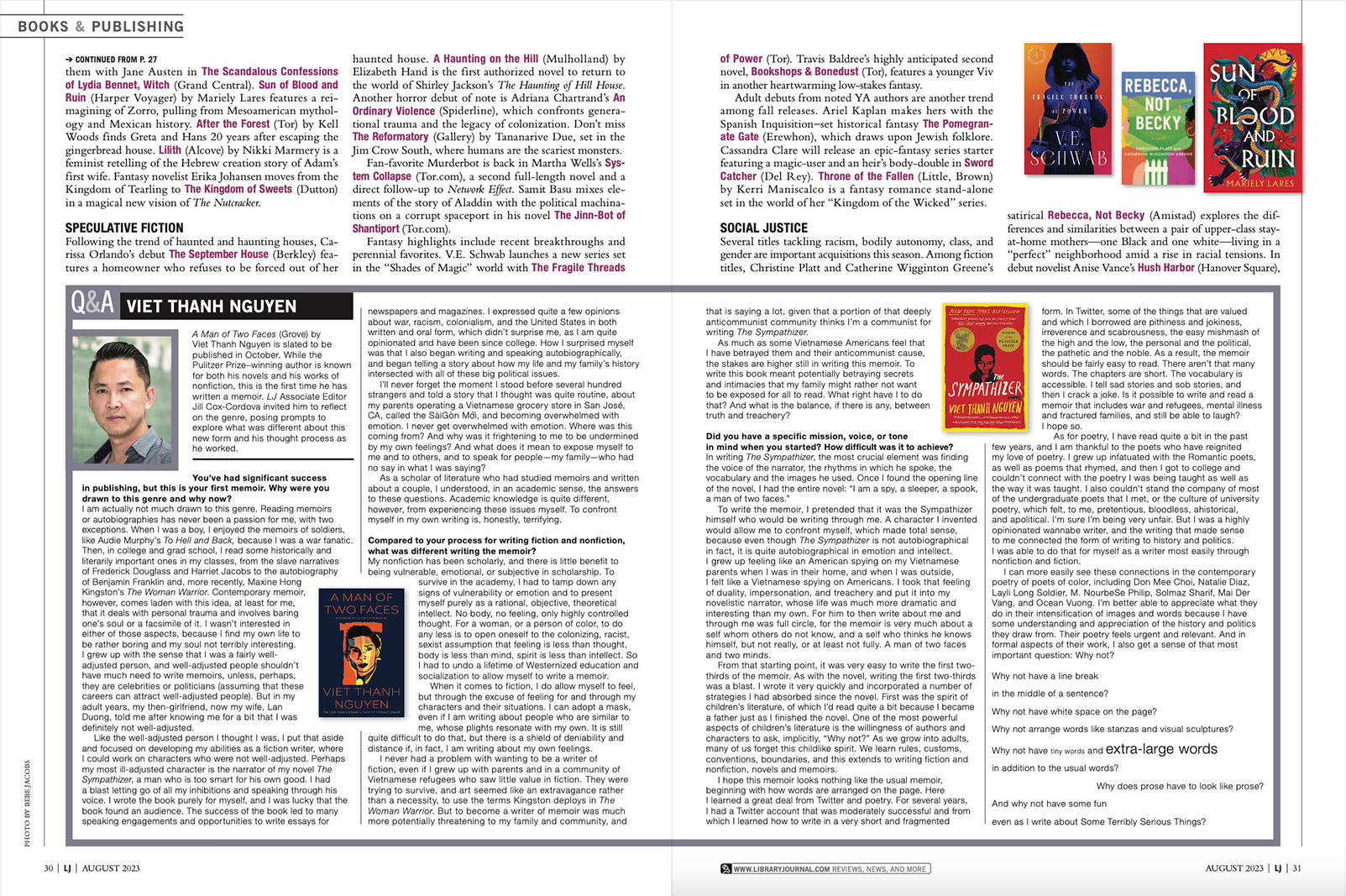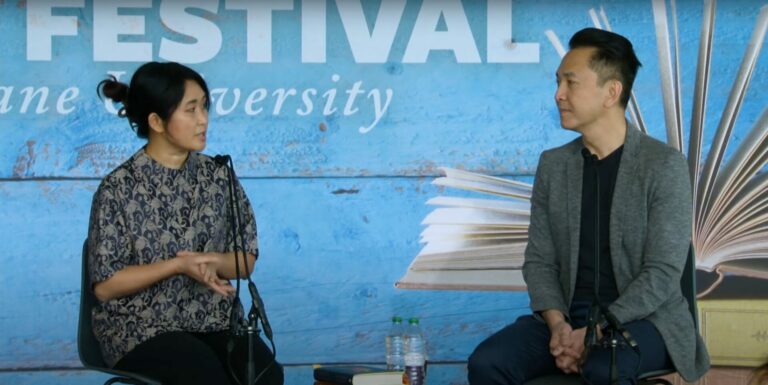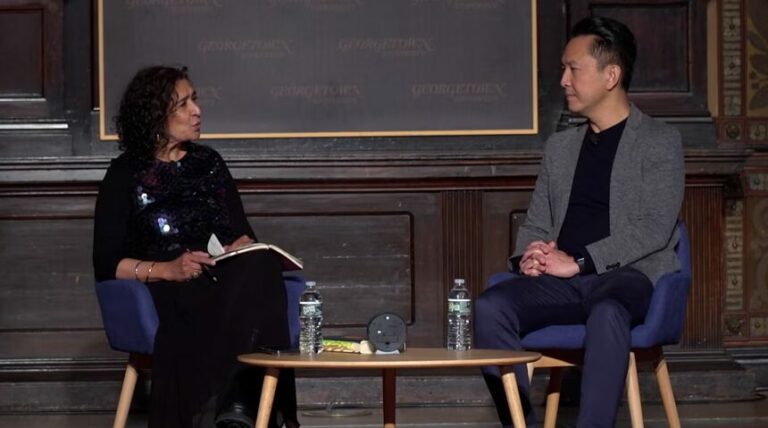This season brings thoughtful—and thought-provoking—books to the fore and showcases ongoing trends, including witches, nostalgia, and retellings. As part of our special focus on fall titles, Viet Thanh Nguyen writes about memoir, on the eve of his first foray into the genre. Also, the LJ book review editors offer picks for the season, as do librarians from around the country. Get ready for an autumn aglow with big reads with Library Journal‘s August 2023 edition.
A Man of Two Faces (Grove) by Viet Thanh Nguyen is slated to be published in October. While the Pulitzer Prize–winning author is known for both his novels and his works of nonfiction, this is the first time he has written a memoir. LJ Associate Editor Jill Cox-Cordova invited him to reflect on the genre, posing prompts to explore what was different about this new form and his thought process as he worked.


You’ve had significant success in publishing, but this is your first memoir. Why were you drawn to this genre and why now?
I am actually not much drawn to this genre. Reading memoirs or autobiographies has never been a passion for me, with two exceptions. When I was a boy, I enjoyed the memoirs of soldiers, like Audie Murphy’s To Hell and Back, because I was a war fanatic. Then, in college and grad school, I read some historically and literarily important ones in my classes, from the slave narratives of Frederick Douglass and Harriet Jacobs to the autobiography of Benjamin Franklin and, more recently, Maxine Hong Kingston’s The Woman Warrior. Contemporary memoir, however, comes laden with this idea, at least for me, that it deals with personal trauma and involves baring one’s soul or a facsimile of it. I wasn’t interested in either of those aspects, because I find my own life to be rather boring and my soul not terribly interesting. I grew up with the sense that I was a fairly well- adjusted person, and well-adjusted people shouldn’t have much need to write memoirs, unless, perhaps, they are celebrities or politicians (assuming that these careers can attract well-adjusted people). But in my adult years, my then-girlfriend, now my wife, Lan Duong, told me after knowing me for a bit that I was definitely not well-adjusted. Like the well-adjusted person I thought I was, I put that aside and focused on developing my abilities as a fiction writer, where I could work on characters who were not well-adjusted. Perhaps my most ill-adjusted character is the narrator of my novel The Sympathizer, a man who is too smart for his own good. I had a blast letting go of all my inhibitions and speaking through his voice. I wrote the book purely for myself, and I was lucky that the book found an audience. The success of the book led to many speaking engagements and opportunities to write essays for newspapers and magazines. I expressed quite a few opinions about war, racism, colonialism, and the United States in both written and oral form, which didn’t surprise me, as I am quite opinionated and have been since college. How I surprised myself was that I also began writing and speaking autobiographically, and began telling a story about how my life and my family’s history intersected with all of these big political issues. I’ll never forget the moment I stood before several hundred strangers and told a story that I thought was quite routine, about my parents operating a Vietnamese grocery store in San José, CA, called the SàiGòn Mói, and becoming overwhelmed with emotion. I never get overwhelmed with emotion. Where was this coming from? And why was it frightening to me to be undermined by my own feelings? And what does it mean to expose myself to me and to others, and to speak for people—my family—who had no say in what I was saying? As a scholar of literature who had studied memoirs and written about a couple, I understood, in an academic sense, the answers to these questions. Academic knowledge is quite different, however, from experiencing these issues myself. To confront myself in my own writing is, honestly, terrifying.
Compared to your process for writing fiction and nonfiction, what was different writing the memoir?
My nonfiction has been scholarly, and there is little benefit to being vulnerable, emotional, or subjective in scholarship. To survive in the academy, I had to tamp down any signs of vulnerability or emotion and to present myself purely as a rational, objective, theoretical intellect. No body, no feeling, only highly controlled thought. For a woman, or a person of color, to do any less is to open oneself to the colonizing, racist, sexist assumption that feeling is less than thought, body is less than mind, spirit is less than intellect. So I had to undo a lifetime of Westernized education and socialization to allow myself to write a memoir. When it comes to fiction, I do allow myself to feel, but through the excuse of feeling for and through my characters and their situations. I can adopt a mask, even if I am writing about people who are similar to me, whose plights resonate with my own. It is still quite difficult to do that, but there is a shield of deniability and distance if, in fact, I am writing about my own feelings. I never had a problem with wanting to be a writer of fiction, even if I grew up with parents and in a community of Vietnamese refugees who saw little value in fiction. They were trying to survive, and art seemed like an extravagance rather than a necessity, to use the terms Kingston deploys in The Woman Warrior. But to become a writer of memoir was much more potentially threatening to my family and community, and that is saying a lot, given that a portion of that deeply anticommunist community thinks I’m a communist for writing The Sympathizer. As much as some Vietnamese Americans feel that I have betrayed them and their anticommunist cause, the stakes are higher still in writing this memoir. To write this book meant potentially betraying secrets and intimacies that my family might rather not want to be exposed for all to read. What right have I to do that? And what is the balance, if there is any, between truth and treachery?
Did you have a specific mission, voice, or tone in mind when you started? How difficult was it to achieve?
In writing The Sympathizer, the most crucial element was finding the voice of the narrator, the rhythms in which he spoke, the vocabulary and the images he used. Once I found the opening line of the novel, I had the entire novel: “I am a spy, a sleeper, a spook, a man of two faces.” To write the memoir, I pretended that it was the Sympathizer himself who would be writing through me. A character I invented would allow me to confront myself, which made total sense, because even though The Sympathizer is not autobiographical in fact, it is quite autobiographical in emotion and intellect. I grew up feeling like an American spying on my Vietnamese parents when I was in their home, and when I was outside, I felt like a Vietnamese spying on Americans. I took that feeling of duality, impersonation, and treachery and put it into my novelistic narrator, whose life was much more dramatic and interesting than my own. For him to then write about me and through me was full circle, for the memoir is very much about a self whom others do not know, and a self who thinks he knows himself, but not really, or at least not fully. A man of two faces and two minds. From that starting point, it was very easy to write the first two- thirds of the memoir. As with the novel, writing the first two-thirds was a blast. I wrote it very quickly and incorporated a number of strategies I had absorbed since the novel. First was the spirit of children’s literature, of which I’d read quite a bit because I became a father just as I finished the novel. One of the most powerful aspects of children’s literature is the willingness of authors and characters to ask, implicitly, “Why not?” As we grow into adults, many of us forget this childlike spirit. We learn rules, customs, conventions, boundaries, and this extends to writing fiction and nonfiction, novels and memoirs. I hope this memoir looks nothing like the usual memoir, beginning with how words are arranged on the page. Here I learned a great deal from Twitter and poetry. For several years, I had a Twitter account that was moderately successful and from which I learned how to write in a very short and fragmented form. In Twitter, some of the things that are valued and which I borrowed are pithiness and jokiness, irreverence and scabrousness, the easy mishmash of the high and the low, the personal and the political, the pathetic and the noble. As a result, the memoir should be fairly easy to read. There aren’t that many words. The chapters are short. The vocabulary is accessible. I tell sad stories and sob stories, and then I crack a joke. Is it possible to write and read a memoir that includes war and refugees, mental illness and fractured families, and still be able to laugh? I hope so. As for poetry, I have read quite a bit in the past few years, and I am thankful to the poets who have reignited my love of poetry. I grew up infatuated with the Romantic poets, as well as poems that rhymed, and then I got to college and couldn’t connect with the poetry I was being taught as well as the way it was taught. I also couldn’t stand the company of most of the undergraduate poets that I met, or the culture of university poetry, which felt, to me, pretentious, bloodless, ahistorical, and apolitical. I’m sure I’m being very unfair. But I was a highly opinionated wannabe writer, and the writing that made sense to me connected the form of writing to history and politics. I was able to do that for myself as a writer most easily through nonfiction and fiction. I can more easily see these connections in the contemporary poetry of poets of color, including Don Mee Choi, Natalie Diaz, Layli Long Soldier, M. NourbeSe Philip, Solmaz Sharif, Mai Der Vang, and Ocean Vuong. I’m better able to appreciate what they do in their intensification of images and words because I have some understanding and appreciation of the history and politics they draw from. Their poetry feels urgent and relevant. And in formal aspects of their work, I also get a sense of that most important question: Why not? Why not have a line break in the middle of a sentence? Why not have white space on the page? Why not arrange words like stanzas and visual sculptures? Why not have *tiny* words and *extra-large* words in addition to the usual words? Why does prose have to look like prose? And why not have some fun even as I write about Some Terribly Serious Things?


